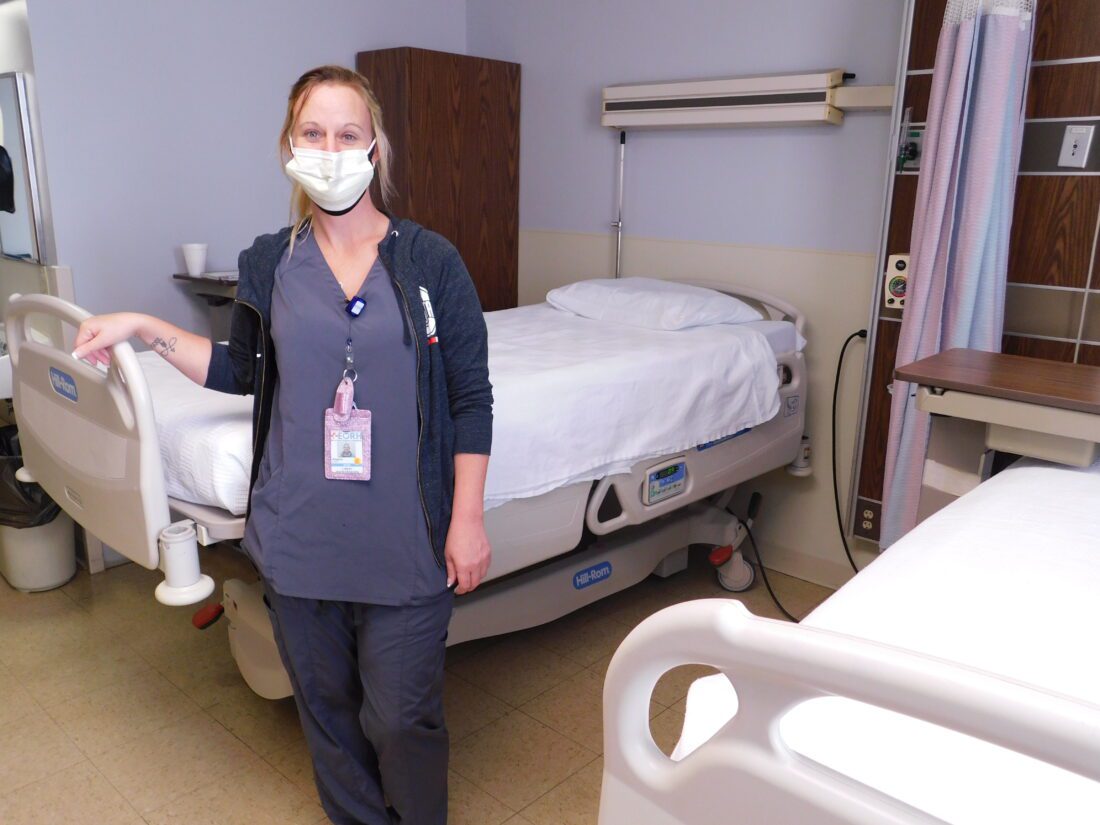EORH adds to detox unit

T-L Photo/ROBERT A. DEFRANK Joy Owens, a nurse at East Ohio Regional Hospital, stands in one of the rooms of the hospital’s expanded detox wing. EORH has expanded services to meet the growing need for addiction services.
MARTINS FERRY — Those struggling with substance abuse and in need of a place to get their system clean in a step toward recovery have an expanded resource in East Ohio Regional Hosptial’s detox facilities.
“We have our new detox unit, drug and alcohol medically detox unit,” Bernie Albertini, chief operating officer at the hospital, said. “So basically if you have an alcoholic who needs to detox, it can be dangerous because they have seizures and stuff. So you’re medically supervised by a provider, and we can take them through protocols that make it a lot easier on them.”
He said the detox program has been active since the hospital reopened in 2021, but has been expanded
“We’re actually making more of a push and more of a dedicated area for it in the last couple weeks. … We’ve had quite a few people come through already,” he said.
Ideally the detox unit can hold 15 people in semi-private rooms, but more can be taken if necessary.
“It was just the next logical service. We’ve been running for a year and a half, and it just made sense to expand out and meet the community needs.”
Julie Ross, chief nursing officer at EORH, said the need has been great.
“We get calls from agencies. They are saying they have to travel a patient four and five hours away to get the type of treatment we do here, so I know there’s a need out there,” Ross said. “One of the things that we saw coming through our emergency department we’re constantly evaluating is ‘What can we treat, what can’t we treat?’ Those things that we see a large volume of, we try to be that type of hospital that can manage those patients. We put a lot of effort into creating a 14-bed detox area.”
“If you look at our basic population, we’re sitting in the middle of a high area of drug and alcohol abuse,” Albertini said. “We’ve had a lot of overdoses in the emergency room. It just makes sense to offer that option to people.”
The detox facilities are open to any patient age 18 or older.
“We do a lot of education through our emergency department, letting the patient and the family know what it’s going to look like so we have a clear expectation from the time the patient arrives at the medical detox,” Ross said. “Sometimes we get an agency referring the patient, sometimes the patient refers themselves. Sometimes the family refers the patient. … We make sure they’re medically cleared, that detox is going to be successful.”
“It’s a multidisciplinary committee, physicians, nursing,” Albertini said. “We got our Access Ohio behavioral health company, our sister company, involved in looking at different drugs, different protocols for those drugs, formalizing them, training the staff, then wheeling it out. … Just more training for the staff we had.”
Employees deal with patients addicted to a wide variety of drugs.
“It’s everything, alcohol and all kinds of drugs. But legal and illegal, we have them come through the emergency room and have them assessed for medical appropriateness,” Albertini said.
“We do a lot of alcohol. We do a lot of heroin and barbiturates, and oftentimes they multi-drug,” Ross said. “It’s an individualized package.”
Albertini said a “typical” stay is usually about two to three days, depending on the drugs the patient is on and how long it takes to get out of their system.
The unit is designed to handle severe cases.
“A patient who would detox at home would have quite a bit of uncomfortable symptoms that we could manage as a medical team … in a safer environment,” Ross said, adding that the hospital also works with patients in planning an outpatient regimen. “Oftentimes … they’ve tried other facilities. They’ve tried to detox before, it’s been unsuccessful.”
Short-term medication is also used to control symptoms and reduce aggressive outbursts and behavior.
“For people going through alcoholism and alcoholic detox, they have a predisposition for seizures, so you basically treat them with medication,” Albertini said. “It’s rougher to go without the medication.”
Ross said the hospital has seen positive results.
“Any case that you’re able to improve someone’s outcome is a success. We have seen quite a bit of patients and families improve from the medical detox, but more importantly, long term, getting them into the programs they might not have known about,” she said. “Detoxing’s not three days — three days is the medical portion” to get the drugs out of their systems.
In the future, Ross said, EORH plans to open 30-day residential treatment facilities.
“At that point they’ll have counseling, they’ll get back to normal,” she said. “We’re going to have aggressive outpatient therapy through our Access Ohio, which is up and running, and even housing where patients will have housing opportunities here in Martins Ferry.”
Plans include the potential purchase of a residence and possibly bussing patients to counseling.
Ross and EORH spokeswoman Kayla Shreve said there have been rumors that EORH was shifting entirely to behavioral health services.
“East Ohio Regional Hospital is staying the same, nothing is changing,” Shreve said. “We still provide all the same services we opened with. We’re expanding on those medical services, the behavioral health is an addition.”
EORH’s owner, Dr. John Johnson, comes from a behavioral health background and sees importance in providing services and care for all aspects of a patient, including needed environmental support.
“We’re not being short term,” Ross said. “We’re being proactive so we can create a different outcome, because most of these patients have been in and out of detox several times.”
The hospital is located at 90 N. Fourth St. For more information, call 866-683-3869.





